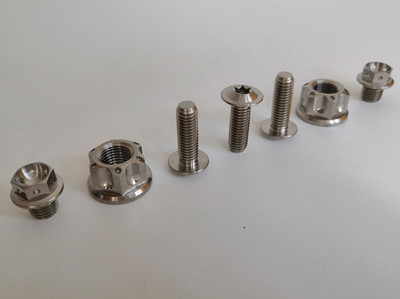- The specific strength (tensile strength/density) of titanium alloy screw is higher (see figure), and the tensile strength can reach 100-140 kgf/mm2, while the density is only 60% of that of steel.
- Medium temperature strength is good, the temperature is several Baidu higher than that of aluminium alloy, it can still adhere to the required strength at medium temperature, and can work for a long time at 450-500 C.
- Good corrosion resistance. Titanium in the atmosphere immediately forms a uniform and fine oxide film, which has the ability to resist the corrosion of various media. In general, titanium has excellent corrosion resistance in oxidizing and neutral media, especially in seawater, wet chlorine and chloride solutions. However, in reducing media such as hydrochloric acid solution, the corrosion resistance of titanium is poor.
- Titanium alloy screw has good low-temperature function, and titanium alloy with very low void elements, such as TA7, can still adhere to certain plasticity at – 253 C.
- Titanium alloy screw has low elastic modulus, low thermal conductivity and no ferromagnetism.
- Titanium alloy screw has high hardness.
- Poor stamping and excellent thermoplasticity.
Titanium alloy screw heat treated by adjusting the heat treatment process can obtain different phase composition and arrangement. It is generally believed that fine equiaxed arrangement has better plasticity, thermal stability and fatigue strength; needle arrangement has higher durability, creep strength and fracture toughness; equiaxed and needle mixed arrangement has better inductive function.
The commonly used heat treatment methods are annealing, solid solution and aging treatment. Annealing is to eliminate internal stress, improve plasticity and arrange stability, so as to achieve better inductive function. Generally, the annealing temperatures of alpha and (alpha+beta) alloys are 120-200 C below the change point of (alpha+beta) beta phase. Solid solution and aging treatment are rapid cooling from high temperature zone to obtain martensite alpha’-phase and metastable beta phase, and then the metastable phase is differentiated by holding in medium temperature zone to obtain fine dispersed second phase particles such as alpha phase or compound. To achieve the purpose of strengthening the alloy. The quenching of general (alpha+beta) alloys is carried out at 40-100 below the change point of (alpha+beta) beta phase, and the quenching of metastable beta alloys is carried out at 40-80 above the change point of (alpha+beta) beta phase. Aging treatment temperature is generally 450 – 550 C. In addition, in order to satisfy the special requirements of the workpiece, two-layer annealing, isothermal annealing, beta heat treatment, thermomechanical heat treatment and other metal heat treatment processes are also used in industry.

